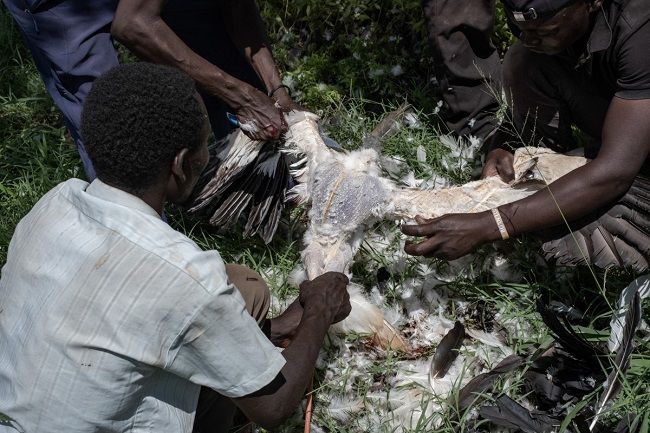Desperation Drives Ugandans to Poison Protected Migratory Birds Amid Hunger Crisis

In the remote village of Ayoreri, near Uganda’s border with Kenya, a heartbreaking scene unfolds with each passing migration season.
Thousands of white storks—majestic, long-legged birds that soar across continents—are being hunted not for sport, but for survival.
As climate change reshapes the agricultural landscape, leaving dry, cracked fields where crops once thrived, communities are resorting to increasingly desperate measures. Among them is 42-year-old Sam Chekwoi, a father of 11.
“I used to be a farmer,” Chekwoi said, his voice heavy with resignation. “But now the sun scorches everything I plant. The rains come too late or not at all. So I turned to the sky—to the birds—for food.”
The white storks, protected under international conservation agreements, travel thousands of miles across Europe and Africa in their seasonal migrations. But in northern Uganda, their arrival has become a grim lifeline for families ravaged by hunger.
Residents, facing near-empty granaries and barren markets, lace maize grains with poison to bring down the birds in droves.
The method is quick—and deadly. The poisoned storks are collected and roasted for meat, shared among families who haven’t seen a proper meal in weeks. “We know it’s wrong,” Chekwoi admitted. “But if your children are crying from hunger, you do what you must.”
Environmentalists are raising alarms over the devastating toll on bird populations. “We are witnessing a quiet ecological tragedy,” said Joseph Luyima, a conservation officer in the region. “These birds are not just symbols of biodiversity. They’re indicators of a collapsing food system.”
Experts say that climate change has accelerated drought cycles across East Africa, crippling local agriculture and increasing food insecurity.
In areas like Ayoreri, traditional farming is no longer sustainable. With little government intervention and dwindling aid, survival often trumps conservation.
The situation highlights a deeper crisis—one where human survival and environmental protection are increasingly at odds. For many in northern Uganda, the choice isn’t between right and wrong. It’s between life and death.
“We don’t enjoy killing the birds,” Chekwoi said softly, watching a flock circle above. “But when the land gives you nothing, what else can you do?”





